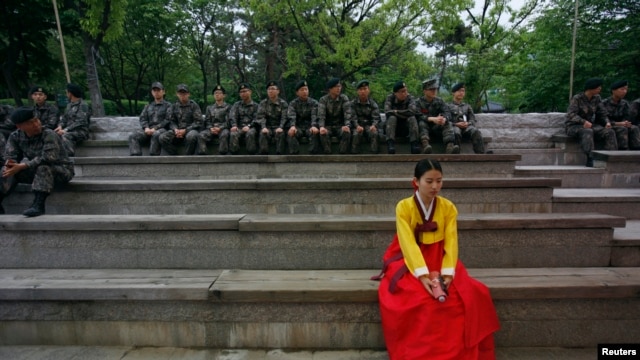
A woman in a traditional Korean Hanbok costume sits in front of South Korean soldiers at Namsangol Hanok Village in Seoul, May 20, 2013.
SEOUL — As South Korea marks the 33rd anniversary of a citizen's uprising, there are questions about whether North Korea secretly attempted to stir social turmoil at the time.
A former commander of U.S. Forces Korea, retired Army General John Wickham, Jr., says it is “plausible” North Korea may have tried to take advantage of unrest in the South during the 1980 uprising, but that he never saw evidence of that.
Wickham, who subsequently served as U.S. Army chief of staff, recalls that he and then-U.S. Ambassador William Gleysteen had “limited intelligence on sources of unrest and activity” in Gwangju, but “We did conclude that the unrest and uprising was South Korean and related to the ongoing coup” by General Chun Doo-hwan amid the turmoil following the assassination of strongman president Park Chung-hee,the father of South Korea's current president, Park Geun-hye.
A citizen's resistance movement in the southwestern city was brutally suppressed by South Korean paratroopers in May 1980, but historians believe it sparked the national democracy movement which, in 1987, led to the first direct presidential election in 16 years.
Twenty-five thousand soldiers were dispatched during the crackdown and more than 200 people died or have never been accounted for.
Most of the casualties were civilians, but soldiers and police also were killed. Some groups have contended the citizen death toll was actually between 1,000 and 2,000.
In recent days, amid the incident's 33rd anniversary, controversy, which has lingered in Gwangju, re-emerged after two cable television news channels aired interviews with North Korean defectors claiming Pyongyang's involvement.
The two stations, Channel A and TV Chosun, separately owned by conservative newspapers, reported that North Korean agents masquerading as South Koreans intended to create social turmoil and bring about the collapse of the government in Seoul.
“A battalion composed of 600 North Korean soldiers penetrated” [into Gwangju]," said a man identified as Im Cheon-yong on a May 13 TV Chosun broadcast. “It was North Korean guerillas who occupied the South Jeolla Provincial Office at the time.”
Im is described as a former North Korean military officer of a special forces unit involved in the uprising.
Two days later, another defector who, unlike Im, appeared with his face blurred and used a pseudonym on Channel A, claimed to be one of the North Korean special forces soldiers who arrived on shore near Gwangju by ship on May 21, 1980.
“We pretended to be Gwangju civilian forces and even attacked the South’s government forces together,” said the man, who used the name of Kim Myeong-guk. “Among the North Korean soldiers who participated in the uprising, some were later promoted to be generals.”
Professor of political science at Yonsei University, Moon Chung-in, a former ambassador and prolific scholar on Korean affairs, calls the assertions “really silly and more than counter-productive” in settling the painful historical legacy.
Official South Korean records do not point to involvement of or infiltration by North Korean agents into Gwangju.
But the fresh allegations seem credible to some, and not only on the far right in South Korea.
“I totally believe it,” says a former U.S. National Security Council staff member with ties to the intelligence community.
The regional specialist points to repeated infiltration by North Korean agents in the decades following the Korean War. Although even he does not see North Korea as the catalyst for the 1980 uprising, which was a grassroots mass movement among those angered by a growing military presence in their cities.
Allegations of possible North Korean involvement in the citizens' movement were initially raised in 1980 by the administration of Chun,who assumed the presidency in September 1980.
Chun was sentenced to death in 1996 for his role in lethally suppressing the Gwangju uprising, but was subsequently pardoned.
The anniversary of the beginning of the siege, May 18, is marked as a somber public holiday in South Korea.
The semi-official Yonhap news agency reports the Gwangju municipal government is vowing to file criminal and civil complaints against anyone, including conservative organizations, Internet users or media outlets, who attempt to distort the legacy of the 1980 civil uprising.
|
|
